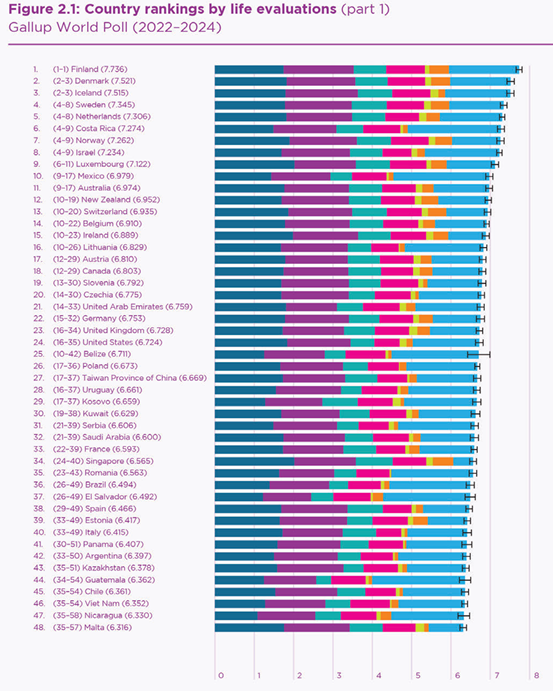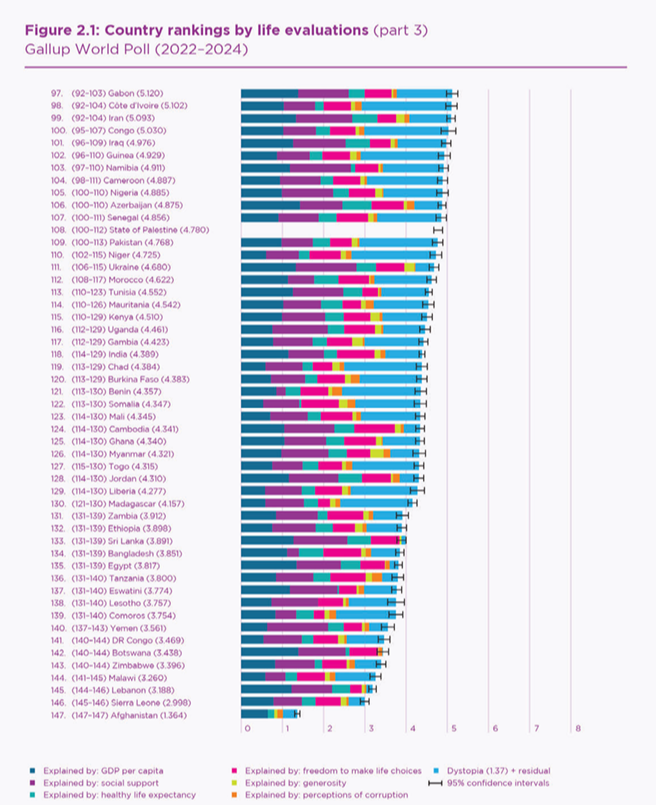The World Happiness Report 2025: The Power of Caring, Sharing, and Social Connection
Happiness is more than just an individual pursuit—it is deeply influenced by our connections with others and the kindness we both give and receive. The World Happiness Report 2024 highlights the profound impact of caring and sharing on our collective wellbeing. Just like Shakespeare’s concept of ‘mercy’ in The Merchant of Venice, caring is “twice-blessed”—benefiting both the giver and the receiver. This year’s report delves into the global trends in benevolence, social interactions, and the policies that foster a happier society.
The Impact of Benevolence on Happiness
The report identifies several key findings related to acts of kindness, such as donating money, volunteering, and helping strangers:
- People underestimate the kindness of others. When researchers conducted a study where they intentionally dropped wallets, the rate of return was significantly higher than what most people expected. This suggests that society is more compassionate than we assume.
- Perceived kindness affects wellbeing. If people believe others are benevolent, they experience higher levels of happiness. Correcting negative misperceptions about society’s kindness can boost overall wellbeing.
- Happiness is more equally distributed in benevolent societies. Those who are least happy benefit the most in communities where kindness is widespread.
- A global ‘benevolence bump’ emerged during COVID-19. Although there was a slight decline from 2023 to 2024, benevolent acts remain 10% above pre-pandemic levels.
- Giving helps the giver. Those who engage in acts of kindness experience increased happiness, especially when their actions have a clear, positive impact on others.
The Social Significance of Sharing Meals
A simple yet powerful way to foster happiness is through sharing meals. The report presents compelling evidence on how eating with others enhances wellbeing:
- Those who eat together are happier. Regularly sharing meals correlates with greater life satisfaction, even after accounting for household size.
- Loneliness is increasing in some regions. In the United States, for example, 1 in 4 people now eat all their meals alone—a 53% increase since 2003.
- Meal-sharing fosters social support. Countries where people frequently dine together tend to report higher levels of social connectedness and lower levels of loneliness.
The Role of Family and Household Size in Happiness
Family structures and household sizes also play a crucial role in determining happiness levels:
- A household size of four to five members predicts the highest happiness. This trend is particularly strong in Latin America and parts of Europe.
- Living alone is associated with lower happiness. Single-person households tend to report lower wellbeing compared to those who live with family or friends.
- Larger families offer valuable lessons. Latin American societies, known for strong family bonds and multi-generational households, provide insights into sustaining long-term wellbeing through close-knit relationships.
Social Connection: A Key Factor in Young People’s Wellbeing
Young people are experiencing a decline in social connectivity, which significantly affects their happiness:
- Social disconnection is rising. In 2023, 19% of young adults reported having no one to rely on for social support—a 39% increase since 2006.
- University friendships matter. Studies show that students who form friendships early in college experience long-term emotional benefits.
- Empathy perception gap. Many young adults underestimate the kindness of their peers, leading them to avoid social interactions. Interventions that correct these perceptions improve their overall happiness.
The Connection Between Benevolence and ‘Deaths of Despair’
A particularly concerning issue in the report is the rise of ‘deaths of despair’—suicides and substance abuse-related deaths. However, there is hope:
- Prosocial behavior reduces deaths of despair. Countries with higher rates of volunteering, donations, and helping strangers see lower suicide and substance abuse rates.
- Decline in deaths of despair in most countries. While rates have decreased in 75% of the studied countries since 2000, they remain high in the U.S. and South Korea.
- Men and older adults are most affected. Deaths of despair are nearly four times higher in men than women and twice as high in older adults compared to younger ones.
Happiness, Politics, and Trust in Society
Trust and happiness play a significant role in shaping political attitudes and the rise of populism:
- Unhappiness fuels political extremism. People who are dissatisfied with life are more likely to support anti-establishment movements.
- Trust determines political leanings. Among unhappy individuals, those who trust others tend to lean left, while those who distrust others tend to lean right.
Global Happiness Rankings: Nordic Countries Rise While Afghanistan Struggles
The latest rankings reveal a stark contrast in happiness levels across the world. Finland continues to top the happiness index, reflecting its strong social support, high trust in institutions, and emphasis on work-life balance. The five Nordic countries have strengthened their positions in the top ten, with Finland rising from rank 7 in 2013 to 1 in 2024, and Iceland climbing from rank 9 to 3. Meanwhile, industrial nations such as Switzerland, Canada, and Australia have dropped out of the top ten. For the first time, none of the large industrial powers ranked in the top 20. Conversely, Afghanistan remains at the bottom of the happiness rankings, with the lowest recorded average life evaluation in the report’s history. Since 2013, Afghanistan’s happiness score has dropped by nearly 2.7 points, reaching a staggering low of 1.36. The situation is even more dire for Afghan women, whose average life evaluation is only 1.16, highlighting severe challenges in wellbeing and social conditions.


Maximizing Happiness Through Effective Giving
For those looking to make the biggest positive impact with their charitable donations, the report offers insights into the effectiveness of different causes:
- Not all charities have the same impact. Some organizations are hundreds of times more effective in increasing happiness than others.
- Mental health interventions are highly effective. Even in low-income countries, mental health programs have shown remarkable cost-effectiveness in boosting wellbeing.
- Strategic giving matters. Donors should aim to fund initiatives that maximize happiness per dollar spent.
Conclusion: A Blueprint for a Happier Society
The World Happiness Report 2024 offers valuable insights into how caring, sharing, and social trust contribute to global happiness. Key takeaways include:
- Acts of kindness benefit both the giver and receiver. Societies that promote benevolence enjoy greater overall wellbeing.
- Social connections—through family, friendships, and meal-sharing—are essential for happiness. Addressing loneliness is a critical public health priority.
- Prosocial behavior can help reduce deaths of despair. Volunteering, donations, and community support play a protective role in mental health.
- Public policies should consider happiness metrics. Economic decisions should factor in their impact on social bonds and wellbeing.
- Strategic philanthropy can maximize happiness. Choosing highly effective charities ensures the greatest positive impact on society.
For Afghanistan and beyond, fostering a culture of care, connection, and trust is essential for building a happier, more resilient society. Investing in social programs, encouraging family cohesion, and promoting prosocial behavior can help individuals and communities thrive.




